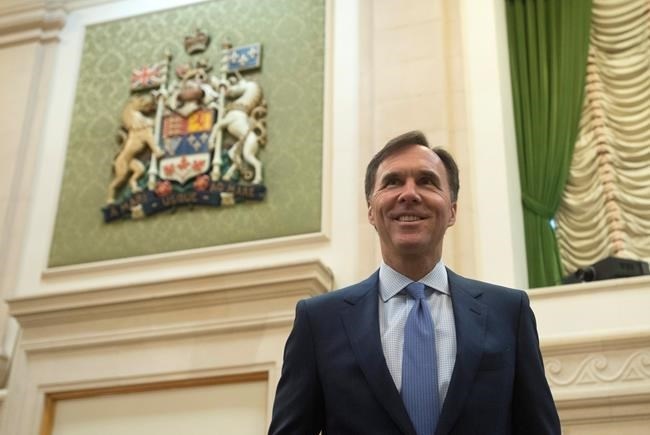
Minister of Finance Bill Morneau waits to appear at the House of Commons Standing Committee on Finance to discuss the recent enhancement to the Canada Pension Plan on Parliament Hill in Ottawa, Monday September 19, 2016.
Image Credit: THE CANADIAN PRESS/Adrian Wyld
September 19, 2016 - 10:06 AM
OTTAWA - The federal government expects the proposed expansion of the Canada Pension Plan to curb economic and employment growth slightly in the short term before boosting both of them in the long run.
Ottawa reached a tentative agreement with provincial governments in June to eventually increase contributions and retirement benefits through the public plan.
New data released by the Finance Department says CPP changes will have a temporary impact on jobs — lowering current employment-growth projections by up to 0.07 per cent.
The government says the pension changes will also trim the forecast for real gross domestic product growth by up to 0.05 per cent over the short term.
But over the long term, the government predicts the pension changes will result in increased GDP growth of up to 0.09 per cent and a 0.06 per cent increase in employment.
The new projections come as Finance Minister Bill Morneau appears before a parliamentary committee to address concerns that enhancing public pensions could further damage Canada's struggling economy.
Morneau has pushed hard to change the CPP, but the expansion is not yet a lock as Ottawa waits for British Columbia to put its make-or-break signature on the deal.
Initially, every province except Quebec backed the agreement in principle and agreed to ratify it by a July 15 deadline.
B.C. later declined to finalize the deal by that date, saying it needed more time to explain it to the public and to seek feedback.
The Finance Department estimates that 1.1 million families are not saving enough for retirement.
The federal government also estimates that by 2021-22, the CPP changes would cost about $260 million per year from the public treasury to help offset the additional financial burden that expansion would eventually place on low-income earners.
Ottawa will enhance its refundable working income tax benefit to help compensate eligible low-wage earners for the higher pension contributions.
The new employee contributions will also be tax-deductible, which Ottawa expects would reduce government revenues by about $710 million by 2021-22.
News from © The Canadian Press, 2016